- Home
- Jana Oliver
Madman's Dance (Time Rovers) Page 7
Madman's Dance (Time Rovers) Read online
Page 7
He launched himself at her in an instant, her neck in his hands, jamming her up against the side of the carriage. She flailed as his grip tightened.
“Just let…it…go,” he grunted, bearing down harder. Black stars swirled in front of her eyes as she struggled to breathe, fingers clawing at his iron grip. She kicked at him, clipping a knee. His fingers loosened for a second, then redoubled in pressure.
Panic exploded within her. Another kick caught him mid-groin, and the air filled with blistering oaths. Cynda jammed a bunched fist into his midsection, as hard as she could. This time he released her, gasping for breath. His face changed as the white fuzziness around him faded.
Cynda flung herself at the far door and it swung open, revealing patchy darkness beyond. She wrenched herself free from the hands on her shoulders, hearing her sleeve rip. When she landed, the impact drove the air out of her. She instinctively rolled, fearing the carriage wheels.
Her head came to rest against a metal support, a gas lamp on the bridge. With a furious shout and the skittering of horses, the carriage screeched to a halt a few feet away. As she pulled herself upward, hands grabbed her from behind. She fought back, trying to keep them away from her neck. Too late, she realized the man’s intent. With a grunt, he hoisted her in the air and heaved her over the side of the bridge.
Cynda sailed downward. The wind billowed her skirts and whistled in her ears. Acting on instinct, she tucked into a ball the moment before she struck the water, then sank into the freezing depths like a bedraggled mermaid heading for a muddy grave.
Chapter 7
Why didn’t someone help her? Furious, Cynda struggled upward. With a tremendous effort she finally broke the surface, only to sink down. Lungs splitting, she clawed desperately toward the surface again. The second time Cynda breached the water something jammed into her shoulder. She grabbed at it blindly. Shivering intensely, she clung to the wooden oar, trying to work her legs free of the cloth wrappings as the pull of the water worked against her efforts. A moment before she lost hold of her lifeline, hands pulled on her, drawing her up. She scraped across something and then flopped face down into the bottom of a boat.
“Why’d ya go and do that?” a rough voice asked. “If ya’d left ’er in there a bit longer, we’d ’ave got more brass tonight.”
“Oh, hush up,” a second voice replied.
Cynda focused on each breath. In…out. In…The breath caught and she choked, spitting up water in a heaving gasp, nearly causing her throat to spasm.
“That’s it girl, ya keep breathing, ya hear?” the second voice commanded.
“Just clunk ’er on the ’ead with the oar. Does the trick every time.”
“I can’t do that.”
The first voice swore. “And I thought we’d get another five shillin’s.” He spat into the water. “Maybe she’s rich, and we’ll get us a reward for findin’ ’er.”
“Not bloody likely. Give me that tarp, will ya?” Something heavy and rough enfolded her. “There ya are, girl. It’s up to ya if ya live or die. I’m not God, so I got no say in the matter.”
Cynda couldn’t speak; her throat hurt too much. She focused on each breath as the watermen chatted back and forth. She finally caught their names: Syd and Alf. It’d been Syd who had suggested they hit her on the head with the oar. Listening to their conversation, it sounded as if they spent their nights hauling passengers back and forth across the Thames. Occasionally, they’d snag a body. Those were always worth money.
Her eyes blinked open when the boat landed.
“Is she still alive?” Syd asked.
Alf peered over at her. “Yup.”
He spat into the water again. “Never get a break.”
~••~••~••~
Saturday, 27 October, 1888
Rose Dining Room
As usual, his superior was already in his chair, paper at his elbow, enjoying his breakfast. They’d traded terse pleasantries and then food had arrived. Still, Satyr sensed that all was not as it should be.
“Are the buyers in London yet?” he inquired, swirling a bit of toast around the plate to capture the remaining bits of egg.
The Ascendant did not answer, but poured himself another cup of tea. Satyr poured his own tea, buying time. He always took it black. The darker the better. In fact, the dining establishment made a separate pot just for him as his superior had pronounced it unpalatable.
Satyr tried again. “Have our customers indicated how they’ll remove the items from London without drawing attention?”
“That is not your concern.”
Satyr’s irritation rose. “On the contrary; as Lead Assassin, everything is my concern if it involves you, sir.”
“The transfer is in hand,” the Ascendant replied tartly.
“Do you need me there to ensure—”
“Not needed.”
What is going on? Why am I suddenly of no importance to this project?
There was a tap on the door. The servers knew never to interrupt them unless they were summoned. Satyr was up and moving in an instant, vanishing into nothing as the knife came out of his pocket.
“Not to concern yourself, Mr. S. It is one of our associates.” The Ascendant put down his cup. “Come!”
That was unwise. His superior had no notion who was on the other side of the door. To Satyr’s surprise, the man who entered was one of his associates. Or at least he was presenting as such. The Lead Assassin remained vigilant.
“Ah, Tobin, there you are,” the Ascendant called in a welcoming tone, beckoning the man forward. “Please come in.”
Satyr returned to his usual form, eyeing the newcomer. Tobin was equally uneasy. He made the customary sweeping motion with his finger across his left wrist, the sign that he was one of the Seven.
Satyr closed the knife and dropped it back into his pocket. Secondary assassins were not invited to this breakfast meeting. That was reserved for the Lead Assassin only, a perquisite of rank.
“Sir,” Tobin greeted, giving a slight bow. He repeated the gesture to Satyr, but the bow wasn’t as deep as it should have been.
Currying favor, are we? The junior assassin was ambitious. Not necessarily a bad trait, but one that put Satyr on edge. There was only one position higher than Tobin’s at present—his own.
“I trust you have good news for me?” the Ascendant inquired.
With another cautious glance toward Satyr, Tobin replied, “Yes, sir. She met her end last evening on Southwark Bridge.”
She? “What is this?” Satyr asked.
“You seemed to have an issue with removing Miss Lassiter, so I asked Tobin here to tidy up the situation. And so he did. Well done, young man.”
The flame of Satyr’s anger ignited. Only the Lead Assassin was allowed to assign a contract to one of the juniors, as he was the best judge of which man and technique should be employed. How dare the Ascendant go around him as if he were some inefficient clerk? “Sir—”
“I know it’s a breach of protocol, but I felt it necessary,” the Ascendant replied. “So how did you do it, Tobin? Did you take my suggestion?”
Suggestion? Now he’s dictating technique. This is outrageous!
Tobin, emboldened by the Ascendant’s praise, explained “Yes, sir. I bribed one of the staff who told me which inmates had been admitted in the last week. Once I knew which one it was, I left, changed forms and returned as Miss Lassiter’s brother. I gave them false dismissal papers, after which she went meekly to her death.”
Their superior leaned forward. “How did you dispatch her?”
“I lured her into a carriage and then strangled her. I threw her body in the river. It sank immediately.”
“Splendid,” the Ascendant remarked, raising an eyebrow in Satyr’s direction. “According to the Lead Assassin the lady was hard to kill.”
“I did not find it so,” the young assassin replied, offering Satyr a smug glance.
Liar. Satyr’s face was a mask of calm. Beneath, lava
boiled in his veins. “I will be filing a protest with the Twenty, sir,” he announced. “Your actions are unacceptable.”
“Oh, don’t be a fusspot, Mr. S.,” the Ascendant retorted with a dismissive wave of his hand. “I just needed to have a good night’s sleep knowing the young woman is no longer a threat.”
“You never said why that was the case.”
“That is not your concern.” At that, he rose. “Come along, Tobin, you can walk me to the cab stand. I want to hear all the details.”
“Yes, sir.”
Satyr remained standing long after the Ascendant and the junior assassin had departed, the lava in his veins now white-hot. The Lassiter woman was to be his kill, the crowning moment in his career, and at a time of his choosing. To have Tobin dispatch her was an insult to both him and the victim.
He forced himself to pour more of the dark tea. Fate had a way of turning the tables on men and their petty ambitions. A showdown was coming, and it would be his task to ensure he’d be the last one standing when all the scores were settled.
~••~••~••~
When Cynda awoke, the watermen were readying the boat for the day’s work. They were on the shore. Cold, she edged closer to the fire as Syd watched her sullenly. He only had one arm and the other one ended in a hook. That scared her.
She yawned, letting the tarp fall away.
Alf turned toward her. “Here, girl,” he said, offering her a cup of something hot. “Tea. It’ll warm ya.” She took the cup, watching the other waterman warily.
Syd shook his head. “Right quiet fer a woman. Most of them yammer yer ears off.”
Alf nodded. “My second missus was like that. Yap, yap, yap. That’s why I went to work on the water. She couldn’t folla me there.”
Syd burst out into laughter, then grew solemn. “What’s yer name, girl?”
She tried to remember, but all she could think of was the handkerchief. Cynda set aside the battered tin cup and reached into a soggy pocket. Pulling out the white fabric, she stared at it. Why was it important? When she unfolded it, soggy pieces of paper clung to the inside.
She held the cloth closer to the fire, trying to understand. There were bits of ink still readable. She squinted at the writing.
“Ja…cynda,” she said. The other pieces were too damaged to read. She tucked away the handkerchief and took hold of the cup once more.
“Well,” Alf observed after taking a puff on his clay pipe, “I guess that’s one way of ’membering who ya are.”
“’Ow’d ya end up in the water?” Syd asked. “Ya jump in?”
She could still feel the smooth hands on her neck, the sensation of floating through the air. “He threw me in.”
“Off that bridge?” Syd pointed upriver. She craned her head around, though to do so made her neck ache more. In the distance, a huge iron structure with three arches rose above the water. She recognized the gas lamps marching across it. Cynda nodded, turning her attention to the tin cup once again. The liquid inside was very hot and she blew on it to cool it. It tasted strong and sweet. She liked that.
“Who did that to ya?” Alf asked.
“Brother.” Not brother.
“Well, ’ell,” Syd said, shaking his head. “I don’t fancy me family, but I don’t try to kill ’em.”
Alf spat on the ground. “Where do you live, girl?”
Scanning the shore, Cynda didn’t see anyplace that looked like home. Then, in the distance, she saw a white fortress. It seemed familiar. “There,” she declared, pointing. “I’ll go there.”
Alf followed her eyes and then laughed. “We got a Royal here, Syd. She says she lives at the Tower.”
“She might; ya never know with that crazy German lot.”
As they chatted back and forth about the eccentricities of the Queen and her brood, Cynda neatly folded the tarp and then handed it to Alf. He stowed it in the boat.
Syd unshipped the oars, one at a time. “Must be goin’. We’re losin’ money ’ere.”
Alf gave her another long look. “Keep yerself safe, girl.”
“If yer gonna keep talkin’ all mornin’, we’re goin’ to lose all the trade,” Syd chided.
“I hear ya.” Alf climbed into the boat and with swift strokes they moved away from the shore. As the craft caught the current, he turned and waved.
Cynda returned it. Once the boat became a small speck on the oily river, she sighted on the white tower and started walking along the Thames. Maybe she did live there. There was only one way to find out.
~••~••~••~
Jacynda’s room was untouched, exactly as it had appeared earlier in the week.
“She hasn’t been back,” Alastair mumbled. Her body wasn’t in the warehouse, and no one had seen her since the night of the fire.
Perhaps they came for her again. They’d done that in the past, but the last time they’d let her take her belongings. That was what made this disappearance different.
Alastair methodically checked the room, but all her possessions appeared to be in the Gladstone. Had she planned on leaving, or just never unpacked? Curious, he opened it up, wondering if he might discover a clue as to her whereabouts.
A spare dress, some undergarments, which he set aside quickly, a brush, toothpowder, and socks. Inside one of the socks was a pocket watch. He opened it and gave the stem a wind. Nothing happened. Perhaps this one wasn’t from the future. Just in case, he tucked it in his pocket to keep it safe.
Then he found a Vespa box. Why would she carry one? She didn’t appear to smoke. Maybe women did in her time.
What an unholy thought.
More digging unearthed a strange stuffed animal. It was caramel-brown with black rings around its eyes and a long, angular body.
“A weasel?” he mused. It seemed an odd thing for her to carry across the centuries. Perhaps it had some hidden meaning.
The final item in the Gladstone was a small box with a hinged lid. Alastair wavered: this was something very private. Perhaps it was best not to pry too far into her personal life. Finally, he gave in to the temptation: he’d already violated her privacy by searching the Gladstone in the first place.
He opened the lid. Inside was a photograph that he remembered well—that of Christopher Stone in his coffin. Alastair had commissioned it so Jacynda would have something to remember her lover by after his violent and untimely death. It tugged at the doctor’s heart that she carried it with her even now.
Stone had been young, perhaps mid- to late twenties. According to Jacynda he was a merry sort who could tell a good joke and had a sense of adventure. Alastair regretted he’d only seen the man after his passing. With a troubled sigh he repacked the case, checked the room one last time, and then headed for the bookshop to return the spare key. There was a finality to this task, weighing him down like a millstone.
Chapter 8
If they wouldn’t feed her here, she’d have to find her own food. Cynda spied the moldy potato in a bin behind a pub. It had black spots on it, but she didn’t care. She dug the worst parts out with her fingers and ate it slowly. It tasted grainy, but was better than nothing.
She’d felt safe in the crazy place. The Mouse Lady had watched over her. There was no Mouse Lady here. Maybe the not brother who threw her in the river would find her. Throw her in again. She looked up, panicking at the thought.
When a portly man walked out of the rear of pub, Cynda shrank back, hiding herself behind a pile of planks. He belched and then unbuttoned his pants. A stream of urine hit the board fence. When he finished, he shook himself and went back inside.
Once the potato was gone she rose. In the distance something caught her eye. It was red, moving in the sooty breeze.
“Pretty,” she said, clambering over the low fence. She heard something rip when her skirt caught. Looking back, she saw a small section of cloth trapped in the boards. She pulled it off and put it in her pocket, not sure why she did it. Her hand touched something else. She unfolded the h
andkerchief like it was a treasure.
The paper inside was still damp. “Jacynda.” That was who she was. That was all she knew. She hid it away again and set her sights on the red shawl hanging on the line in the next backyard. A quick tug made it hers. It smelled clean. She wrapped it around her shoulders and continued on.
When someone brushed against her on the street she jerked away, anxious. Just an old woman with a basket of apples. They looked so good. Maybe she could take one and the old lady wouldn’t notice.
“Hey, girl,” a man called out. “Pretty shawl ya got there.”
“It’s mine,” she declared, looking around for a means of escape.
“I didn’t say it wasn’t,” the man replied with a toothy grin. “Why don’t we go into the pub? Have a drink and a laugh.”
“No,” she said, backing up. The leer on his face frightened her.
“Ya hungry?” he asked, moving in closer. “I got some food.” He stretched out his hand, displaying a half loaf of bread.
Not right.
She fled before he could reach her.
~••~••~••~
Keats moved closer to hear the man’s voice, he spoke so softly.
“It was that warehouse there.” The watchman pointed, then spat on the ground. “Heard about Effington. Good riddance.”
Clancy snorted his approval.
“Were you there the night Dillon was hurt?” Keats asked.
“Yeah.” The watchman pursed his lips. “I never seen nothin’ like that. Just hit him, no warnin’. Left him bleedin’ like ya would a dog. Couldna cared less.”
“Dillon asked about a particular load. Did you see it?”
The man nodded. “I saw the casks. Somethin’ odd about them. Got no notion of what was in them boxes.”
“Boxes?” Keats repeated, his pulse picking up like a hound sighting a hare.
“Yeah. Didn’t have no markin’s on ’em.”

 Mind Games
Mind Games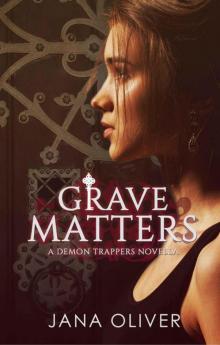 Grave Matters
Grave Matters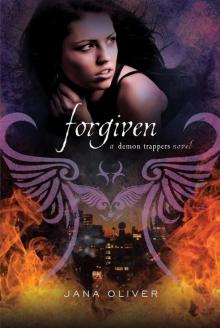 The Demon Trappers 3: Forgiven
The Demon Trappers 3: Forgiven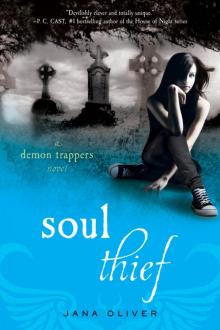 Forbidden
Forbidden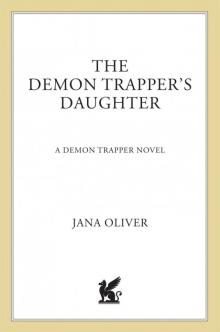 Forsaken
Forsaken Briar Rose
Briar Rose The Demon Trappers: Foretold
The Demon Trappers: Foretold Madman's Dance (Time Rovers)
Madman's Dance (Time Rovers)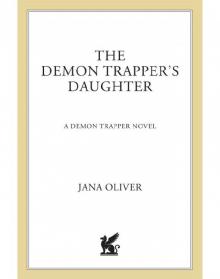 The Demon Trapper’s Daughter
The Demon Trapper’s Daughter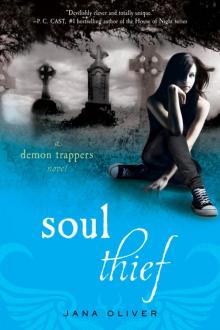 Soul Thief-Demon Trappers 2
Soul Thief-Demon Trappers 2 Mind Games (Demon Trappers Book 5)
Mind Games (Demon Trappers Book 5) The Demon Trappers: Forgiven
The Demon Trappers: Forgiven